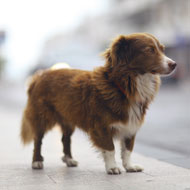
Battersea says new efforts are needed to improve compliance
Over seven in 10 stray dogs cannot be easily reunited with their owners because their microchip is not up to date, a new survey suggests.
In April this year, just 29 per cent of dogs collected by 51 local authorities had up-to-date microchips, according to a report by Battersea Dogs and Cats Home. This represents a decline from 31 per cent last year.
Even more worryingly, 35 per cent of stray dogs did not have a microchip at all, despite this being a legal requirement since April 2016.
Battersea is calling on pet owners, vets and microchip databases to do more to ensure contact details are kept updated.
Chief executive Claire Horton said: “Battersea believes more can be done to improve the current situation and ensure microchipping enables stray dogs to be returned home safely. All stakeholders can do their bit to improve the current situation - from database companies, to vets, to welfare organisations.”
The charity urged databases to contact their customers regularly to ensure their contact details are up to date; to make the process of updating as easy as possible; and to process requests for updates promptly.
A new microchip database, the National Veterinary Database, launched in 2016 with these issues in mind. The data service allows clients’ contact details to be automatically updated via their veterinary practice.
Commenting on Battersea’s report, an NVD spokesperson said: “These findings concur with what we found several years ago. To help tackle this problem we created an automatic updating service which makes it easy for pet owners to keep their details current. Veterinary practices can register for this service at www.nvds.co.uk”.
Battersea said its report also highlighted an emerging issue, which is the number of stray dogs with foreign microchips. This should be investigated further to find out if these dogs are being imported illegally without proper vaccinations.
Horton added: “If it is assumed that there is a link between the provenance of the chip and the country from which the dog has originated, then a protocol may be required for handling and rehoming dogs with foreign chips from countries where rabies is endemic.
"Ideally, the establishment of a database to register dogs imported into the UK would help to confirm that these dogs have entered the UK legally and have had the correct vaccinations.”



 The veterinary mental health charity Vetlife is inviting the veterinary community to join it for a sponsored cold-water dip.
The veterinary mental health charity Vetlife is inviting the veterinary community to join it for a sponsored cold-water dip.